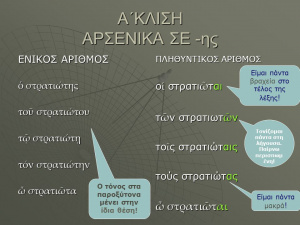Language/Ancient-greek-to-1453/Grammar/Ancient-Greek-First-Declension
The nouns of the first declension - Πρώτη κλίση ουσιαστικών
Ελληνικά |
English |
Français |
|---|---|---|
| Τα ουσιαστικά στην αρχαία ελληνική γλώσσα
διακρίνονται σε τρεις κλίσεις: α΄ κλίση, β΄ κλίση, γ΄ κλίση Οι αριθμοί των ουσιαστικών, όπως και των άλλων πτωτικών, είναι τρεις: ο ενικός, ο δυϊκός και ο πληθυντικός. |
In Ancient Greek, all nouns are classified
according to grammatical gender (masculine, feminine, or neuter) and are used in a number (singular, dual, or plural). All Greek nouns belong to one of three inflection patterns, called the : first (α΄) declension, second (β΄)declension, and third (γ΄) declension. Each represents a particular set of case endings for gender, number, and case. This lesson introduces first (α΄) declension nouns. The nouns of the first declension end in : |
En grec ancien, tous les noms sont classés
selon leur sexe grammatical (masculin, féminin ou neutre) et ils sont utilisés dans un certain nombre (singulier, double ou pluriel ). Tous les noms grecs appartiennent à l'un des trois motifs de déclinaison, appelées: première (α΄) déclinaison, deuxième (β΄) déclinaison, et troisième (γ΄) déclinaison. Chacune représente un ensemble particulier de fins de cas, pour le sexe, le nombre et le cas. Cette leçon présente les premiers noms de la déclinaison (α΄). Les noms de la première déclinaison se terminent par: |
Ελληνικά |
| Η πρώτη κλίση στα αρχαία ελληνικά περιλαμβάνει ονόματα αρσενικά και θηλυκά.
Στα αρσενικά ανήκουν όσα λήγουν σε: 1. -ης, π.χ. στρατιώτης και σε 2. -ας, π.χ. λοχίας Στα θηλυκά ανήκουν όσα λήγουν σε: 1. -η, π.χ. ψυχή, μουσική και σε 2. -α, π.χ. ὥρα, γλῶσσα Χρειάζεται προσοχή, γιατί από τα θηλυκά σε -α άλλα 1. σχηματίζουν τη γενική σε -ας, π.χ. ὥρα, ὥρας και άλλα 2. σχηματίζουν τη γενική σε -ης, π.χ. γλῶσσα, γλώσσης. |
English |
| Are masculine : nouns of end in:
1. –ης : στρατιώτης ( soldier , but in the speeches « ἄνδρες στρατιῶται » : soldiers! ) end in 2. –ας : λοχίας ( sergeant ) are Feminine : nouns of end in: 1. –η : ψυχή ( psyche ), μουσική ( music ) *2. –α : ὥρα ( hour ), γλῶσσα ( tongue)** * any art over which the Muses presided : poetry sung to music, generally art or letters ** The plural genitive is always perispomene (~ ): θυρ-ῶν, γλωττ-ῶν. |
Français |
| α ) féminines : ces qui se terminent :
1) -η : ψυχή ( l’âme), μουσική ( la musique) *et en 2) -α : ὥρα ( l’heure ), γλῶσσα ( la langue ) β) masculins (noms d'hommes, de métier, et noms propres) en : 1) -ης : στρατιώτης ( le soldat, mais dans les discours « ἄνδρες στρατιῶται » soldats !) et en 2 ) -ας : λοχίας ( le sergent ) La prudence est de mise, car les féminines en -α 1. forment le génitif en -as, par ex. N : ὥρα, G : ὥρας et d'autres 2. forment le génitif en -ης, par ex.: N : γλῶσσα, G : γλώσσης** *Tous les arts présidé par les Muses: poésie chantée en musique et généralement autour de l'art ou des lettres ** Le génitif pluriel accepte toujours une périspomène (~ ) : θυρ-ῶν, γλω-ττῶν. |
Concentrated table of names α' declension
| αρσενικά σε
masculine in |
| ||||
| θηλυκά σε
Feminine in |
| ||||
| ||||||||||||||||||||||||||||||
Attention: γῆ, γῆς (earth - terre) : No plural
|
Second type of noun: la terre / earth
|
== Author ==
- Ευγενική χορηγία που στοχεύει να βοηθήσει μαθητές ή μη, απανταχού της Γης, που επιδίδονται στην εκμάθηση της ελληνικής γλώσσας!
- Contribution bénévole visant à aider les personnes, partout dans le monde, qui sont engagées dans l'apprentissage de la langue grecque !
- Voluntary contribution aimed at helping people, all over the world, who are committed to learning the Greek language!

